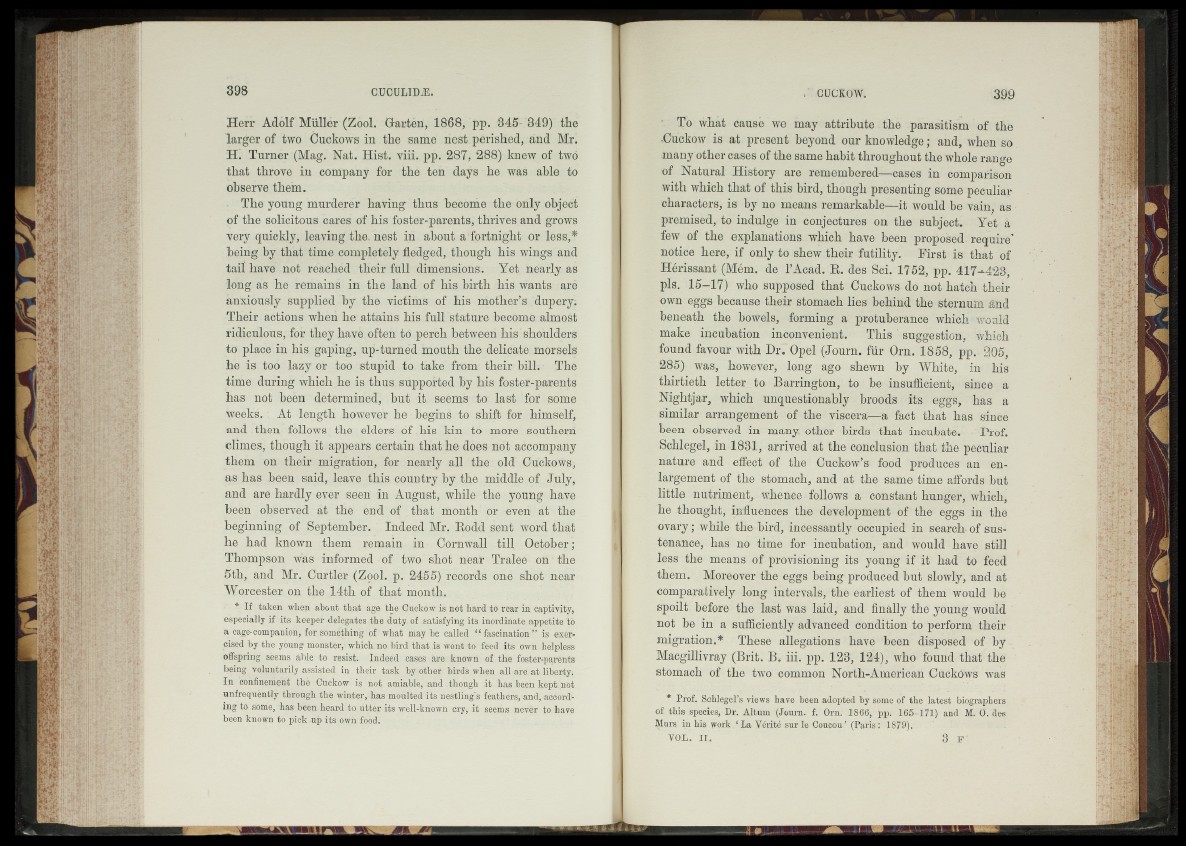
Herr Adolf Müller (Zool. Harten, 1868, pp. 345- 849) the
larger of two Cuckows in the same nest perished, and Mr.
H. Turner (Mag. Nat. Hist. viii. pp. 287, 288) knew of two
that throve in company for the ten days he was able to
observe them.
The young murderer having thus become the only object
of the solicitous cares of his foster-parents, thrives and grows
very quickly, leaving the. nest in about a fortnight or less,*
being by that time completely fledged, though his wings and
tail have not reached their full dimensions. Yet nearly as
long as he remains in the land of his birth his wants are
anxiously supplied by the victims of his mother’s dupery;
Their actions when he attains his full stature become almost
ridiculous, for they have often to perch between his shoulders
to place in his gaping, up-turned mouth the delicate morsels
he is too lazy or too stupid to take from their bill. The
time during which he is thus supported by his foster-parents
has not been determined, but it seems to last for some
weeks. At length however he begins to shift for himself,
and then follows the elders of his kin to more southern
climes, though it appears certain that he does not accompany
them on their migration, for nearly all the old Cuckows,
as has been said, leave this country by the middle of July,
and are hardly ever seen in August, while the young have
been observed at the end of that month or even at the
beginning of September. Indeed Mr. Rodd sent word that
he had known them remain in Cornwall till October;
Thompson was informed of two shot near Tralee on the
5th, and Mr. Curtler (Z90I. p. 2455) records one shot near
Worcester on the 14th of that month.
* If taken when about that age the Cuckow is not hard to rear in captivity,
especially if its keeper delegates the duty, of satisfying its inordinate appetite to
a cage-companion, for something of what maybe called “ fascination” is exercised
by the young monster, which no bird that is wont to feed its own helpless
offspring seems able to resist. Indeed cases are known of the foster-parents
being voluntarily assisted in their task by other birds when all are at liberty.
In confinement the Cuckow is not amiable, and though it has been kept: not
unfrequently through the winter, has moulted its nestling’s feathers, and, according
to some, has been heard to utter its well-known cry, it seems never to have
been known to pick up its own food.
To what Cause we may attribute the parasitism of the
.Cuckow is at present beyond our knowledge ; and, when so
many other cases of the same habit throughout the whole range
of Natural History are remembered—cases in comparison
with which that of this bird, though presenting some peculiar
characters, is by no means remarkable—it would be vain, as
premised, to indulge in conjectures on the subject. Yet à
few of the explanations which have been proposed, require'
notice here, if only to shew their futility. First is that of
Hérissant (Mém. de 1’Acad. R. des Sci. 1752, pp. 417-423,
pis. 15-17) who supposed that Cuckows do not hatch their
own eggs because their stomach lies behind the sternum and
beneath the bowels, forming a protuberance which would
make incubation inconvenient. This ' suggestion, which
found favour with Dr. Opel (Journ. für Orn. 1858, pp. 205,
285) was, however, long ago shewn by White, in his
thirtieth letter to Barrington, to be insufficient, since a
Nightjar, which unquestionably broods its eggs, has a
similar arrangement of the viscera—a fact that has since
been observed in many, other birds that incubate. Prof.
Schlegel, in 1831, arrived at the conclusion that the peculiar
nature and effect of the Cuckow’s food produces an enlargement
of the stomach, and at the same time affords but
little nutriment, whence. follows a constant hunger, which,
he thought, influences the development of the eggs in the
ovary ; while the bird, incessantly occupied in search- of sustenance,
has no time for incubation, and would have still
less the means of provisioning its young if it had to feed
them. Moreover the eggs being produced but slowly, and at
comparatively long intervals, the earliest of them would be
spoilt before the last was laid, and finally the young would
not be in a sufficiently advanced condition to perform their
migration.* These allegations have been disposed of by
Macgillivray (Brit. B. iii. pp. 123, 124), who found that the
stomach of the two common North-American Cuckóws was
* Prof. Schlegel’s views have been adopted by some of the latest biographers
of this species, Dr. Altum (Journ. f. Om. 1866, pp. 165-171) and M. Ö. dee
Murs in his work ‘ La Vérité sur le Coucou’ (Paris: 1879).
VOL. II. 3 F'